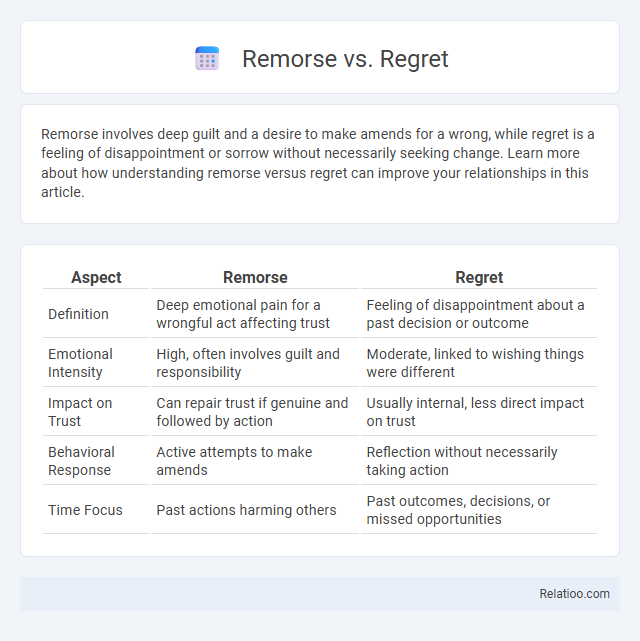Remorse involves deep guilt and a desire to make amends for a wrong, while regret is a feeling of disappointment or sorrow without necessarily seeking change. Learn more about how understanding remorse versus regret can improve your relationships in this article.
Table of Comparison
| Aspect | Remorse | Regret |
|---|---|---|
| Definition | Deep emotional pain for a wrongful act affecting trust | Feeling of disappointment about a past decision or outcome |
| Emotional Intensity | High, often involves guilt and responsibility | Moderate, linked to wishing things were different |
| Impact on Trust | Can repair trust if genuine and followed by action | Usually internal, less direct impact on trust |
| Behavioral Response | Active attempts to make amends | Reflection without necessarily taking action |
| Time Focus | Past actions harming others | Past outcomes, decisions, or missed opportunities |
Understanding Remorse and Regret
Understanding remorse involves recognizing a deep, often personal acknowledgment of guilt for causing harm or wrongdoing, which carries a strong emotional component tied to accountability. Regret typically refers to a feeling of disappointment or sorrow over a missed opportunity or poor decision without necessarily implying moral responsibility. You can distinguish remorse from regret by noting that remorse motivates corrective action and emotional repair, while regret is more passive and focuses on wishing past events had occurred differently.
Key Differences Between Remorse and Regret
Remorse involves a deep sense of guilt and personal responsibility for a wrongdoing, often accompanied by a desire to make amends, whereas regret is a feeling of sorrow or disappointment about a past decision or outcome without necessarily implicating moral responsibility. You feel remorse when your actions conflict with your ethical standards, leading to self-reproach, while regret can stem from any unfavorable result, even those beyond your control or moral judgment. Understanding the key differences helps you navigate emotional responses, distinguishing between moral accountability and simple disappointment.
The Psychology Behind Remorse
Remorse involves deep emotional pain and a strong sense of personal responsibility for causing harm, often leading to profound guilt and a desire to make amends. Regret typically refers to dissatisfaction or disappointment about past choices without the intense self-blame characteristic of remorse. Understanding the psychology behind remorse reveals its crucial role in promoting empathy, moral development, and motivating behavioral change, helping you grow from mistakes.
Exploring the Roots of Regret
Regret stems from reflecting on past decisions and recognizing missed opportunities or mistakes, often triggering a desire to undo or change those actions. Unlike remorse, which involves a deeper emotional response tied to guilt and accountability for harming others, regret can be more cognitive, centered on personal loss or disappointment. Exploring the roots of regret reveals how individuals process choices, weigh consequences, and seek meaning in their experiences to inform future behavior.
Emotional Impact: Remorse vs Regret
Remorse involves a deep emotional response tied to guilt and a desire to make amends, often prompting behavioral change. Regret reflects a feeling of sadness or disappointment about a past decision without necessarily involving guilt or moral responsibility. The emotional impact of remorse is more intense and transformative, while regret tends to be less severe and more focused on missed opportunities.
How Remorse and Regret Influence Behavior
Remorse and regret both influence behavior by prompting reflection and motivating change, but remorse involves a deeper emotional response tied to guilt and responsibility, often leading to reparative actions. Regret typically centers on wishing past decisions had been different, which may result in cautious future choices without necessarily triggering a strong sense of personal accountability. Understanding how your feelings of remorse or regret shape your actions can help you respond more thoughtfully and improve your decision-making processes.
Common Triggers for Remorse and Regret
Common triggers for remorse often involve actions causing significant harm to others, such as betrayal or dishonesty, leading to deep personal guilt and a desire for atonement. Regret typically arises from decisions resulting in missed opportunities or adverse outcomes, emphasizing a sense of loss and reflection on alternative choices. Both emotions share the experience of wishing to change past behaviors but differ in the intensity and focus of their emotional consequences.
Coping Strategies for Remorse and Regret
Coping strategies for remorse involve acknowledging the emotional pain and seeking forgiveness, often through sincere apologies and making amends to those harmed. In contrast, coping with regret focuses on learning from past mistakes and implementing behavioral changes to prevent recurrence, fostering personal growth and resilience. Both require self-reflection, but remorse emphasizes emotional healing, while regret centers on proactive problem-solving and future improvement.
Growth and Learning from Remorse and Regret
Remorse involves a deep emotional response to a moral failing, driving you toward genuine self-reflection and meaningful growth by acknowledging wrongdoing and seeking to make amends. Regret centers more on wishing past actions or decisions were different, which can highlight lessons learned and inform better future choices without the intense moral self-reproach of remorse. Understanding the distinction between remorse and regret empowers your personal development by transforming negative feelings into proactive learning opportunities.
Remorse and Regret in Relationships
Remorse in relationships involves a deep sense of guilt and responsibility for causing harm, often prompting sincere efforts to make amends and rebuild trust. Regret reflects a feeling of sadness or disappointment about past actions or decisions without necessarily acknowledging personal fault or responsibility. Understanding the difference between remorse and regret helps partners navigate emotional accountability, fostering stronger communication and emotional healing in relationships.

Infographic: Remorse vs Regret
 relatioo.com
relatioo.com